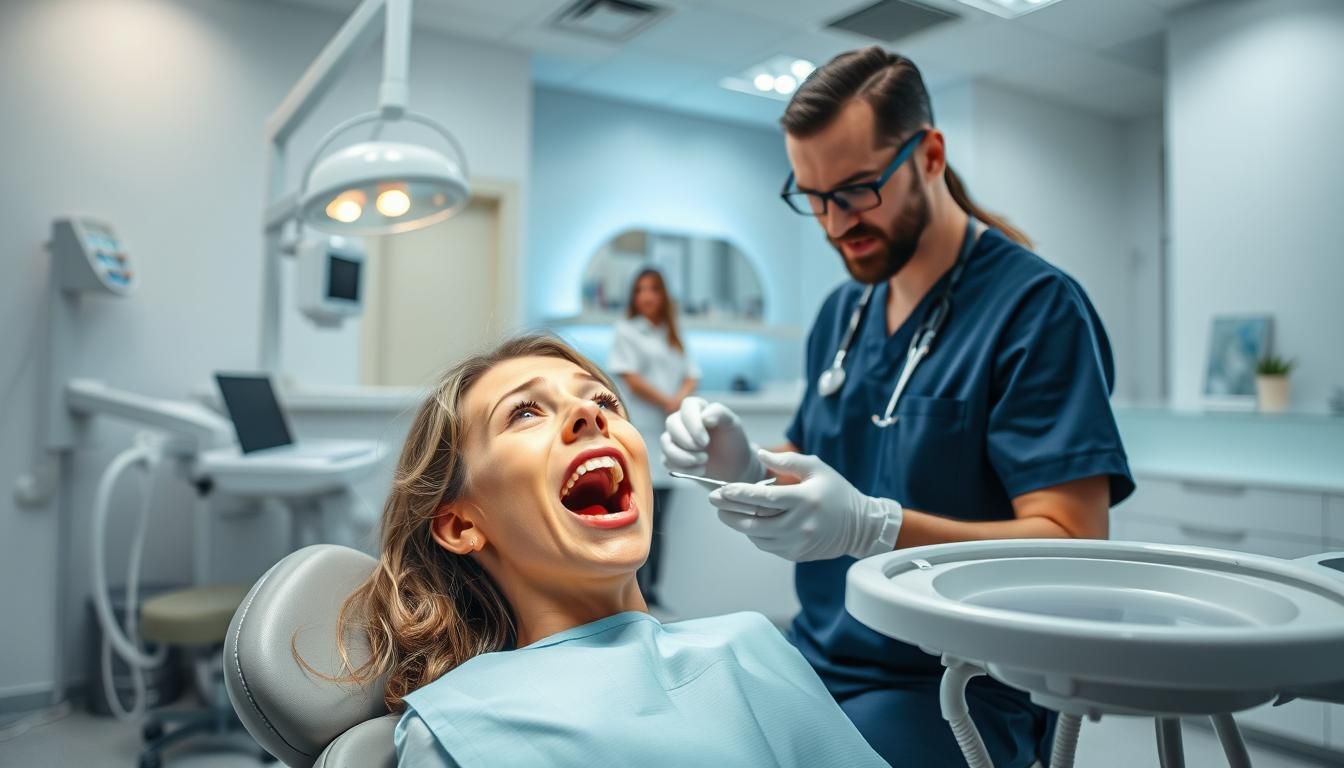What Can The ER Do For A Dental Emergency?
What Can The ER Do For A Dental Emergency?
When a dental emergency happens, knowing where to go for help is key. Emergency rooms (ERs) are there for you in urgent situations. They can help with severe pain, bleeding, or facial injuries.
Even though ERs can't do detailed dental work, they can give pain relief and antibiotics. They also do basic dental care to make you stable. But, for a full fix, you need to see an emergency dentist .

Key Takeaways
- ERs are equipped to handle severe dental pain, bleeding, and facial trauma.
- Emergency rooms can administer pain relief and prescribe antibiotics for dental infections.
- ERs provide basic emergency procedures but lack specialized dental equipment.
- For long-term solutions, consulting an emergency dentist is essential.
- Understanding when to visit the ER for a dental issue can save time and reduce complications.
Understanding Dental Emergencies
Dental emergencies can be very painful and stressful. They often need quick attention to avoid more problems. It's important to know how to handle these emergencies to keep your teeth and overall health in good shape.
Common Types of Dental Emergencies
Dental emergencies come in many forms, and each one can lead to serious complications if not treated promptly. Here’s a breakdown of the most common types of dental emergencies, what they involve, and why immediate care is important:
- Severe Toothache
A throbbing or sharp pain that won't go away can be a sign of an underlying issue like decay, infection, or nerve damage. This may require root canal therapy or an emergency extraction. - Cracked or Broken Tooth
A fractured tooth can result from trauma, grinding, or biting something hard. It can expose the inner layers of the tooth, increasing the risk of infection or further breakage. - Knocked-Out Tooth (Avulsed Tooth)
If a tooth is completely dislodged from the socket, it’s a true emergency. Quick action (within 30–60 minutes) can sometimes save the tooth if it's preserved properly and reimplanted by a dentist. - Loose or Partially Dislodged Tooth
A tooth that has become loose due to injury or impact may still be salvageable with prompt treatment to stabilize and splint it. - Dental Abscess
This is a serious infection at the root of a tooth or between the gum and the tooth. It can cause swelling, fever, and pus discharge. If left untreated, the infection can spread to other parts of the body. - Lost Filling or Crown
Losing a filling or crown can expose sensitive parts of the tooth and cause pain or structural damage. Temporary dental cement can help, but professional repair is needed. - Broken or Damaged Braces
A broken wire or bracket can cause injury to your cheeks or gums. In some cases, it can disrupt your orthodontic progress and should be repaired quickly. - Injury to Soft Tissues
Cuts or lacerations to the gums, tongue, cheeks, or lips can bleed heavily and may require stitches or infection control. - Persistent Bleeding After Dental Work
Some bleeding is normal after extractions or surgeries, but if it continues for hours, you may need emergency intervention. - Jaw Pain or Dislocation
TMJ (temporomandibular joint) issues or blunt force trauma can cause jaw dislocation or misalignment, making it difficult to speak, eat, or open your mouth.
When to Seek Immediate Help
If you have bleeding that won't stop, pain that doesn't go away with regular medicine, or see damage to your teeth and soft tissues, get help fast. An emergency dentist available 24/7 in Washington, DC can help stop these problems from getting worse.
Symptoms to Watch For
Look out for signs like severe pain, swelling, fever, or bleeding. Spotting these symptoms early can help treat issues like abscesses quickly. This can prevent more serious problems and help with toothache relief .
When to Visit the ER for Dental Pain
Dental pain can be really tough to deal with. It's important to know when to go to the ER. People in Washington, DC should go if they have symptoms that are too hard to handle at home.
Severe Toothache
A bad toothache can really hurt and might need ER care. If the pain is so bad it stops you from doing daily things, or if pain meds don't work, you should get help. Abscesses can make the pain worse and need a doctor's check-up.
Facial Swelling and Fever
from dc-dentistry https://www.dc-dentistry.com/what-can-the-er-do-for-a-dental-emergency
via DC Same Day Dental Crowns
Comments
Post a Comment